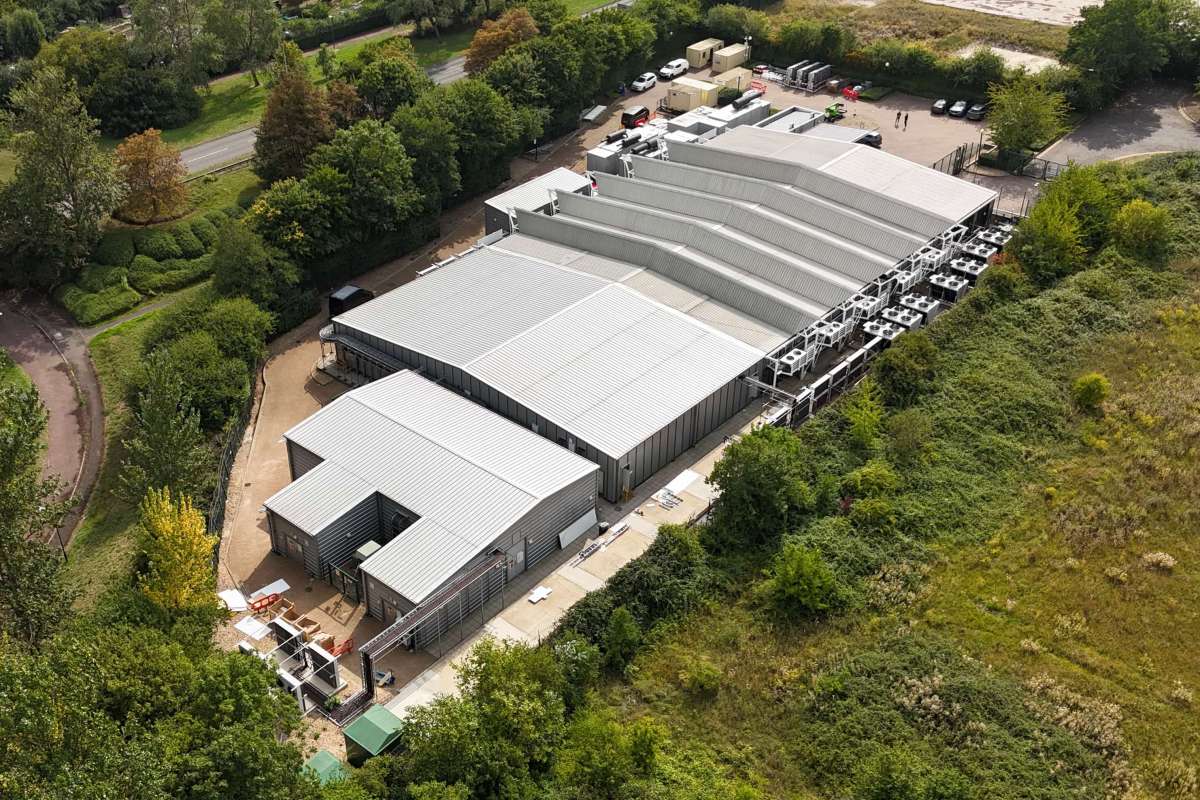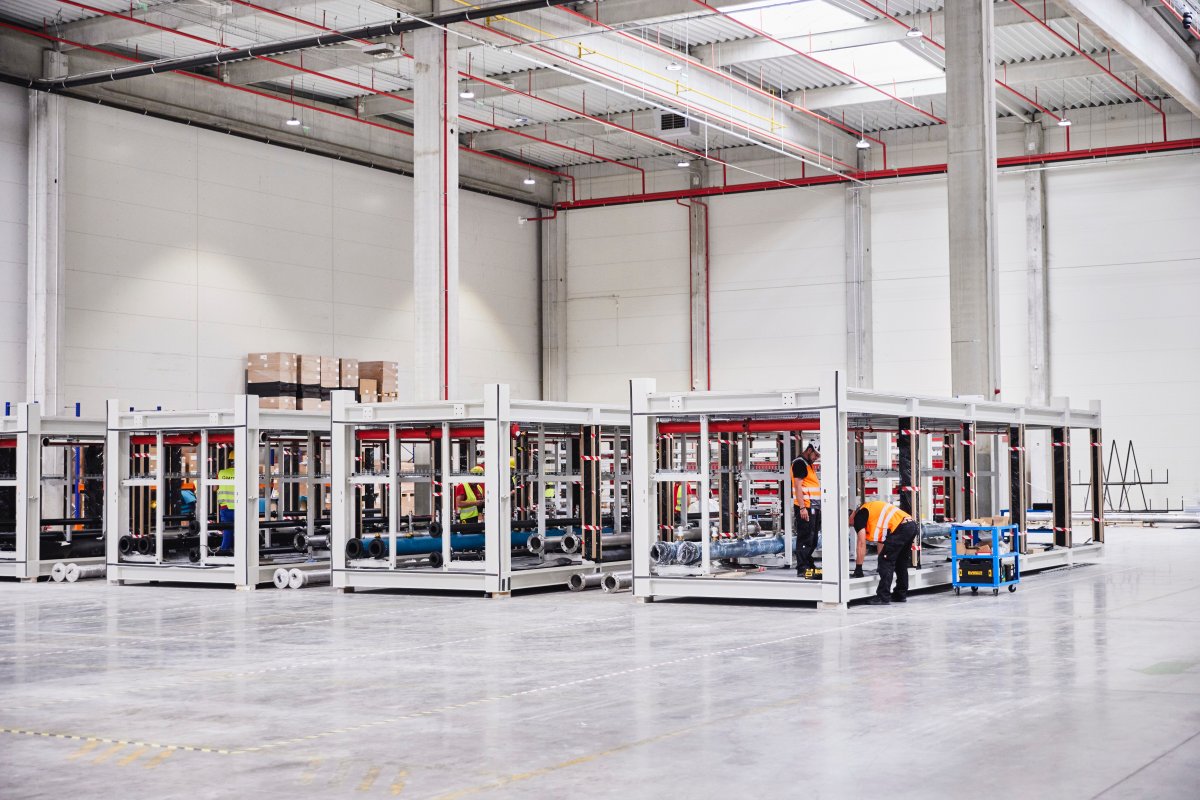Commercial Real Estate: Property Developments, Trends & Infrastructure
Commercial Real Estate: Property Developments, Trends & Infrastructure
Data Centre Build News & Insights
Data Centre Business News and Industry Trends
Data Centre Projects: Infrastructure Builds, Innovations & Updates
Pulsant opens high-density UK facility outside London
UK data centre operator Pulsant has completed a £10 million investment in a new high-density data hall at its Milton Keynes site, SE-1.
The facility has been developed to support increased demand for artificial intelligence and advanced computing workloads, with the expansion forming part of Pulsant’s national platformEDGE framework, extending high-performance, UK-based infrastructure outside the London market.
The 1.2MW expansion is designed for high-density computing applications, including AI, machine learning, and accelerated workloads. These use cases are commonly associated with sectors such as financial services, healthcare, biotechnology, IT, and gaming.
Regional capacity beyond the London market
Pulsant positions the Milton Keynes site as an alternative location for organisations seeking UK data centre capacity outside London. The site sits within the Oxford-Cambridge technology cluster, which is home to around 570,000 employees and generates approximately £135 billion in annual turnover.
The facility offers latency of around two milliseconds to London Docklands and Slough. It forms part of Pulsant’s network of 14 UK data centres, interconnected via a 400Gb-capable network, providing access to more than 1,600 cloud services, network providers, and business partners.
The launch follows increased focus on domestic digital infrastructure, including government funding aimed at strengthening UK AI capability. Milton Keynes has continued to attract technology businesses, supported by regional business networks and digital innovation activity.
Rob Coupland, CEO at Pulsant, says, “The £10 million expansion of our Milton Keynes data centre is another big investment in our digital platform to meet hunger for high density compute power.
"UK digital infrastructure is facing unprecedented demand. With AI-ready capacity in short supply, bringing high performance, flexibility, and choice to regional locations is critical.
“For organisations looking for ultra-low latency, international connectivity, and UK sovereign compute power, Milton Keynes is a great option compared to constrained and costly London data centres which lack the opportunity for expansion.
“Our unique platform gives local, national, and international clients the flexibility to circumvent some of the risks associated with the London cluster while maintaining high performance, resilience, and connectivity.”
Pulsant states that it plans to roll out its high-density model to additional UK regions as part of its wider national infrastructure strategy.
For more from Pulsant, click here.
Joe Peck - 9 February 2026
Commercial Real Estate: Property Developments, Trends & Infrastructure
Data Centre Business News and Industry Trends
Insights into Data Centre Investment & Market Growth
News
nLighten expands footprint through Paris site acquisition
nLighten, a European data centre operator, has announced the acquisition of a data centre in Émerainville, Paris from oXya, a provider of SAP cloud services and managed IT infrastructure. The facility becomes nLighten's eighth site in France and adds to its portfolio of over 30 data centres in seven markets.
Strategically located in Paris's eastern data centre cluster, approximately one kilometre from nLighten's existing PAR1 facility, the site will continue serving anchor customer oXya under a long-term master services agreement, while additional capacity will be made available to enterprise customers via channel partners.
The facility is designed to support high-density and AI-ready configurations, providing scalable infrastructure that evolves with customer requirements.
nLighten says its approach emphasises delivering sustainable, interconnected infrastructure tailored to enterprise needs, with "seamless connectivity between [its] sites."
Expanding digital infrastructure
Harro Beusker, CEO and co-founder of nLighten, comments, "The acquisition of this Paris data centre represents a significant expansion of our French footprint and strengthens our position in one of Europe's most dynamic digital infrastructure markets.
"Paris is a critical hub for regional connectivity and this facility enables us to deliver enhanced capacity and resilience to our enterprise customers. The proximity to our existing Paris sites creates operational synergies while also allowing us to support dual-site deployments.
"This acquisition exemplifies our strategy of building smart, sustainable infrastructure that scales with customer needs and contributes to the digital transformation of European businesses."
Anwar Saliba, Managing Director at nLighten France, adds, “This acquisition fully aligns with our ambition to build a distributed, locally operated digital infrastructure across France.
"By adding capacity in the Paris region through three interconnected sites, we provide our customers with the conditions needed to deploy more resilient architectures, better secure their data, and meet growing requirements in terms of performance, service continuity, and digital sovereignty."
Christophe Bronner, Group Chief Financial Officer at oXya, states, "We are pleased to see this data centre continue its evolution thanks to the partnership with nLighten.
"This transition allows oXya to focus on its core business of delivering managed cloud services and consulting to our customers, while ensuring continuity and enhanced capabilities for our infrastructure needs.
"We believe nLighten's expertise and commitment to sustainable operations will benefit both our organisation and the broader customer community.”
For more from nLighten, click here.
Joe Peck - 2 February 2026
Commercial Real Estate: Property Developments, Trends & Infrastructure
Data Centre Build News & Insights
Data Centre Business News and Industry Trends
Sustainable Infrastructure: Building Resilient, Low-Carbon Projects
BCS Consultancy launches Sustainable Development Service
BCS Consultancy, a global data centre consultancy, has launched a new Sustainable Development Service and appointed James Rogers Jones as Head of Sustainable Development.
The new service formalises sustainability as a core element of BCS Consultancy’s project management, cost management, commercial advisory, and technical delivery work, rather than a standalone offering.
The move reflects increasing client demand for advice that balances commercial delivery with environmental impact, community expectations, and long-term operational resilience.
James joins BCS Consultancy with experience supporting major data centre operators, including Digital Realty, Google, GreenScale, and AtlasEdge. His work has focused on sustainability strategy, regulatory compliance, and operational performance across complex data centre portfolios.
James comments, “Data centres underpin our modern economy and are one of the most impactful industries in the world. These assets can deliver enormous value to both clients and the communities they serve.
"Sustainability should no longer be framed primarily around ESG-signalling or long-term carbon targets; instead, it is increasingly becoming linked to energy security, price stability, and operational resilience.”
Responding to community and planning pressures
The Sustainable Development Service will support clients with long-term decision-making, including data centre roadmaps, portfolio strategy, sustainability frameworks, and policy advisory.
It is also intended to address growing development pressures, as community opposition and project cancellations increase across several data centre markets.
BCS Consultancy points to findings from its forthcoming 2026 Data Centre Trends Report, which indicate that communities are seeking more than renewable energy commitments when considering data centre developments.
Concerns increasingly relate to water usage, local electricity pricing, and wider quality of life impacts. The consultancy states that operators must demonstrate their role as responsible local stakeholders alongside meeting environmental targets.
The launch of the service forms part of BCS Consultancy’s wider approach to supporting clients through continued growth in global digital infrastructure and increased demand driven by AI workloads.
The consultancy positions sustainability as a contributor to long-term value for both clients and host communities.
Chris Coward, Chief Operating Officer at BCS Consultancy, says, “Our clients are facing increasingly complex challenges from power constraints and planning risk to community scrutiny and long-term resilience. They need a simpler way to achieve their sustainability goals with project managers, cost managers, and technical experts who understand sustainability and can deliver outcomes as part of their day job.
“The launch of our Sustainability Service is about delivering better outcomes and aligns with how our clients expect us to operate. James brings both credibility and clarity of thinking, and his appointment strengthens our ability to support responsible, long-term decision-making across the entire lifecycle.”
For more from BCS Consultancy, click here.
Joe Peck - 2 February 2026
Commercial Real Estate: Property Developments, Trends & Infrastructure
Data Centre Build News & Insights
Data Centre Business News and Industry Trends
Data Centre Projects: Infrastructure Builds, Innovations & Updates
XYZ Reality appoints new COO and CFO
XYZ Reality, a provider of augmented reality (AR) and real-time project controls, has appointed Bruno P.S. Rocha as Chief Operating Officer (COO) and Soroosh Keshtgar (pictured above) as Chief Financial Officer (CFO) at a time when demand is increasing across data centre construction projects.
The company says adoption of its construction delivery platform is rising across hyperscale data centre and mission-critical environments, with projects increasing in scale and complexity. The appointments are intended to support operational growth and long-term expansion.
As COO, Bruno will be responsible for operational execution, aligning teams, and strengthening consistency across delivery as the company expands across markets and customers. His remit also includes shaping the operating model and supporting planned fundraising activity.
He has previously held senior roles at Palantir and Gecko Robotics, with experience in engineering-led and robotics organisations. He joins XYZ Reality with a background focused on applying technology to physical-world operations.
Soroosh joins as CFO as the company scales into larger projects and prepares for further international growth. His role will focus on strengthening financial systems, processes, and governance to support decision-making and future investment.
He began his career in aerospace engineering before qualifying as a chartered accountant at PwC. He has since held senior finance roles in high-growth organisations, with experience in scaling finance functions during periods of rapid expansion and organisational change.
Leadership to support mission-critical growth
David Mitchell, founder and CEO of XYZ Reality, says, “As we scale the business, it’s critical that we strengthen our leadership team alongside the customer base and technology.
"Bruno and Soroosh bring the experience, perspective, and operational discipline we need to support increasingly complex projects and build a resilient company for long-term growth.”
Bruno Rocha, COO at XYZ Reality, comments, “XYZ Reality is at a real inflection point. The technology is proven and the momentum is clear; now it’s about building a company that can scale well beyond a single product or market.
"This is about solving real problems in construction. With the right people and ambition, there’s a genuine opportunity to rethink how construction is delivered end to end.”
Soroosh Keshtgar, CFO at XYZ Reality, adds, “As XYZ Reality scales into larger, more complex projects, financial clarity becomes critical.
"My focus is on building the systems, transparency, and insight that allow the business to make confident, data-informed decisions, supporting customers, investors, and the wider team as we grow.”
For more from XYZ Reality, click here.
Joe Peck - 27 January 2026
Commercial Real Estate: Property Developments, Trends & Infrastructure
Data Centre Build News & Insights
Data Centre Business News and Industry Trends
Data Centre Projects: Infrastructure Builds, Innovations & Updates
Nostrum, JLL partner for 800MW development in Spain
Nostrum Data Centers, a developer of sustainable data centre infrastructure across Spain and Europe, has engaged JLL, a global commercial real estate and investment management company, to advance its AI-ready platform in Spain.
Leveraging JLL’s global data centre experience, Nostrum says it is aiming to strengthen its customer engagement strategy and advance Spain’s emergence as a next-generation connectivity hub.
In December 2025, Nostrum announced its data centre assets will be available in 2027, with power and land secured across all sites. The company is developing 500 MW of sustainable IT capacity across Spain, with an additional 300 MW planned for expansion.
The company’s six data centre developments are strategically located throughout Spain to leverage existing connectivity and power infrastructure. Each facility is in alignment with the United Nations Sustainable Development Goals (SDGs), offering a PUE of 1.1 and a WUE of zero, eliminating water usage for cooling.
Sustainable development in Spain
Gabriel Nebreda, Chief Executive Officer at Nostrum Group, comments, “Nostrum Data Centers has a long-term vision for balancing innovation and sustainability.
"We offer our customers speed-to-market and scalability throughout our various locations in Spain, all while leading a green revolution to ensure development is done the right way as we position Spain as the next connectivity hub.
“We are confident that our engagement with JLL will be able to help us bolster our efforts and achieve our long-term vision.”
Jason Bell, JLL Senior Vice President of Data Center and Technology Services in North America, adds, “Spain has a unique market position with its access to robust power infrastructure; its proximity to Points of Presence (PoPs), internet exchanges, subsea connectivity; and being one of the lowest total cost of ownership (TCO) markets.
“JLL is excited to be working with Nostrum Data Centers, providing our expertise and guidance to support their quest to be a leading data centre platform in Spain, as well as position Spain as the next connectivity hub in Europe and beyond.”
For more from Nostrum Data Centers, click here.
Joe Peck - 7 January 2026
Commercial Real Estate: Property Developments, Trends & Infrastructure
Data Centre Business News and Industry Trends
Data Centre Infrastructure News & Trends
Enterprise Network Infrastructure: Design, Performance & Security
1547 announces the McAllen Internet Exchange (MCT-IX)
fifteenfortyseven Critical Systems Realty (1547), a developer and operator of interconnected data centres and carrier hotels across North America, has announced the launch of the McAllen Internet Exchange, known as MCT-IX, located within the Chase Tower in McAllen, Texas.
Chase Tower has long operated as a carrier hotel and a key aggregation point for cross-border network traffic between the United States and Mexico. The introduction of an internet exchange within the building provides a local platform for traffic exchange in a facility already used by multiple network operators.
MCT-IX has been formally registered with ARIN and is now accepting initial participants, with several networks already committing ports.
Interest in the exchange follows continued growth in network activity within Chase Tower. During 2025, the site has seen additional carrier deployments, capacity expansions by existing network operators, and increased demand for cross-connects.
The building’s owner has invested more than $6 million (£4.4 million) in infrastructure upgrades, covering backup power, lifts, fire and life safety systems, and HVAC improvements.
Capacity expansion and interconnection investment
1547 has also expanded interconnection infrastructure within the building, including the development of a new meet-me room and a dedicated carrier room.
The additional space is designed to support growing cross-connect demand and to provide direct access between networks, the new internet exchange, and other tenants within the facility.
Further capacity expansion is underway to support both existing data centre tenants and future MCT-IX participants; this includes an additional 500 kW of colocation capacity within Chase Tower, alongside a separate 3MW, 13,000ft² data centre annex. Both projects are scheduled for completion in Q4 2026.
J. Todd Raymond, CEO and Managing Director of 1547, says, “Announcing MCT-IX is an important milestone for both 1547 and the McAllen market.
"With formal ARIN recognition and early port commitments already underway, it is clear there is strong demand for an internet exchange that builds on the long-established interconnection ecosystem inside Chase Tower.
"As owners of the carrier hotel, we are committed to supporting this next phase of growth.”
The exchange is expected to reduce reliance on upstream routing that currently sends cross-border traffic outside the region before reaching its destination, giving networks a more local option for traffic exchange.
John Bonczek, Chief Revenue Officer of 1547, adds, “Across Chase Tower, we are seeing measurable increases in interconnection activity, from new deployments to expanded capacity and growing interest in route diversity.
"MCT-IX aligns with the needs of the ecosystem inside the building and complements our planned expansion.”
1547 says it will provide further updates as the exchange progresses through its launch phases and participation increases.
For more from 1547, click here.
Joe Peck - 17 December 2025
Commercial Real Estate: Property Developments, Trends & Infrastructure
Data Centre Architecture Insights & Best Practices
Data Centre Build News & Insights
Data Centre Business News and Industry Trends
InfraPartners, JLL partner to accelerate AI DC delivery
InfraPartners, a designer and builder of prefabricated AI data centres, and JLL, a global commercial real estate and investment management company, have formed a strategic agreement to accelerate the development and operation of AI data centres.
The partnership brings together InfraPartners’ prefabricated AI data centre designs and JLL’s capabilities in site selection, project management, construction oversight, financial structuring, and facilities management.
The companies state that the combined model is intended to address persistent challenges in data centre development, particularly the period between site identification and operational readiness.
As investment in AI infrastructure grows, operators increasingly require deployment models that offer predictable schedules, reduced risk, and scalable designs suitable for GPU-heavy environments.
Data centre construction continues to face risks associated with labour shortages, schedule delays, and complex financing.
InfraPartners and JLL say they aim to manage these issues jointly by integrating design, prefabrication, delivery, and long-term operations into a single framework.
Prefabrication and integrated delivery for AI infrastructure
“Our clients are asking for faster, lower-risk routes to delivering AI infrastructure,” says Michalis Grigoratos, CEO at InfraPartners. “Our prefabricated, upgradeable digital infrastructure integrates seamlessly with JLL’s expertise across the full project lifecycle, so, together, we’re focused on providing a superior product that keeps pace with AI infrastructure changes and market growth.
"Our globally scalable, repeatable approach includes site selection, prefabrication, and long-term operations, reducing time-to-first-token and maximising performance across the lifecycle.”
Matt Landek, JLL Division President, Data Centers and Critical Environments, adds, “AI infrastructure demands a new approach - one that’s as dynamic and high-performing as the workloads it supports.
“With InfraPartners, we are delivering a unique blueprint that brings real estate, engineering, and operational precision into a unified model.”
Kristen Vosmaer, Managing Director at JLL, oversees global programme management, including JLL White Space and facilities management solutions, and supports delivery of the partnership.
He comments, “This is one of the first collaborations to fully integrate data centre design, manufacturing, construction, commissioning, computer deployment, and lifecycle management for institutional-grade real estate delivery, marking a significant shift in shortening the time to monetisation for how mission-critical infrastructure assets are developed and maintained.”
The companies plan to offer end-to-end capabilities intended to accelerate the delivery of AI-ready facilities for enterprise, government, and cloud operators.
Initial deployment efforts will focus on high-growth AI markets in EMEA and the United States from Q1 2026, with plans to expand into additional regions.
For more from InfraPartners, click here.
Joe Peck - 21 November 2025
Commercial Real Estate: Property Developments, Trends & Infrastructure
Data Centre Business News and Industry Trends
Insights into Data Centre Investment & Market Growth
News
Signings for European AI DC capacity treble in 2025
Demand for data centre capacity dedicated to artificial intelligence (AI) has surged across Europe this year, as emerging AI infrastructure providers - often referred to as neoclouds - accelerate their expansion efforts amid slowing hyperscaler activity.
According to new research from commercial real estate and investment firm CBRE, signings for AI-focused colocation capacity reached 414MW in the first nine months of 2025, up from 133MW compared to the same period in 2024.
More than half of this capacity (57%) was signed in the Nordics.
The increase reflects a market shift as hyperscaler demand has moderated temporarily and neocloud providers are securing large-scale capacity to meet the growing requirements of AI-driven applications.
Neoclouds taking the lead
Data centre operators are implementing measures to manage the additional risk associated with leasing to neocloud firms, including higher rental rates to offset build costs and ensure returns on AI-ready facilities.
Andrew Jay, Head of Data Centre Solutions, Europe at CBRE, notes, “Neoclouds have expanded their footprint in Europe this year by absorbing vacant space that was originally intended for hyperscalers.
"It is a sign that many data centre providers are growing more comfortable with the ambitions of neocloud providers and the covenants that come with it.”
Kevin Restivo, Director, European Data Centre Research at CBRE, adds, “Neocloud providers are taking AI-specific capacity at scale in Europe.
"We see tremendous growth of this segment especially in the Nordics, where lower-cost renewable power is often available in greater abundance than in many other European markets.”
For more from CBRE, click here.
Joe Peck - 14 November 2025
Commercial Real Estate: Property Developments, Trends & Infrastructure
Data Centre Business News and Industry Trends
News
Report: Scotland emerging as key DC growth market
According to new analysis by Lichfields, Scotland’s combination of renewable energy, available land, and skilled talent is creating strong interest among developers assessing new large-scale data centre projects.
The study by the UK planning and development consultancy highlights how the UK’s data centre industry currently contributes around £4.7 billion to the economy each year, with forecasts suggesting a further £44 billion could be added by 2035 through construction and operation.
Scotland is well placed to capture a significant share of that growth, producing 113% of its electricity consumption from renewables in 2022 and exporting surplus clean power to the grid.
Primed for large-scale projects
Lichfields’ analysis references a previous site-shortlisting exercise led by Scottish Futures Trust, Crown Estate Scotland, and Scottish Enterprise, which identified a range of potential locations including Aberdeen, Dundee, Fife, and parts of the Highlands, with the right combination of renewable capacity, land availability, and technical expertise.
However, most large-scale schemes remain concentrated in southern England, reflecting differences in planning support and grid capacity.
Dan Evans, Associate Director at Lichfields, says, “For developers, Scotland offers something few regions or countries can match: abundant low-carbon energy, space for expansion, and a strong engineering base.
"The combination of renewable generation, cool climate, and established technical skills creates ideal conditions for sustainable data centre operations.
“Across the UK, we’re seeing growing demand from investors and operators looking for sites that balance performance, cost, and environmental responsibility. Scotland’s renewable strength and land availability tick those boxes, but delivery confidence remains key.
"Developers need clarity on where projects will be supported and how long approvals will take. A consistent national position, backed by local planning frameworks, would make a real difference in turning interest into investment.”
What is needed
The analysis points to several practical measures to help maintain momentum, including allocating land for data centre development in new Local Development Plans, using Masterplan Consent Areas to simplify consents for complex or multi-use sites, and encouraging early coordination between planning authorities, developers, and energy providers.
It highlights the £3.9 billion regeneration of the former Ravenscraig steelworks in North Lanarkshire as evidence of growing confidence in Scotland’s potential.
The project, which includes one of the UK’s largest AI-ready data centres, will support around 2,000 long-term jobs and deliver a £1.2 billion construction boost, contributing an estimated 0.4% to Scotland’s GDP each year once operational.
Dan continues, “Scotland has an opportunity to position itself as a genuine alternative to traditional UK data centre clusters. By combining its renewable capacity with a more agile planning approach, it can attract long-term global investment, create skilled employment, and strengthen its reputation for sustainable growth.
“Developers are ready to commit where policy, infrastructure, and delivery are properly coordinated. With the right signals from government and local authorities, Scotland could move from potential to performance very quickly.”
Joe Peck - 11 November 2025
Commercial Real Estate: Property Developments, Trends & Infrastructure
Data Centre Build News & Insights
Data Centre Business News and Industry Trends
Data Centre Projects: Infrastructure Builds, Innovations & Updates
News
Zoho to open new UK data centre
Zoho, a provider of cloud-based business software and productivity tools, has announced it will open a new UK data centre in the first quarter of 2026. The announcement comes alongside 43% growth in the UK and a tripling of staff numbers over the past two years.
The new facility will allow customers to retain data within the UK, addressing demand for greater data sovereignty, particularly in sectors such as financial services and the public sector. The company will also relocate its UK office from Bletchley to Milton Keynes in the same quarter to support further team expansion.
Strengthening UK operations and compliance
Zoho’s UK strategy is built around its Transnational Localism programme, which provides local teams to support customer needs and contribute to self-reliant regional economies. The latest growth expands its customer-facing staff across sales, support, and marketing.
Sachin Agrawal, UK Managing Director of Zoho, says, "In a constantly moving landscape impacted by geopolitical tensions and economic instability we are focusing deeply on enhancing the customer experience we provide to our UK customer base.
"We understand the shift to customers wanting to host their data within the boundaries of the UK, which is particularly important in industries such as the public sector and financial services. Data privacy and protection continue to be at the core of our operations and is enhanced further with our new data centre.
"Investment in our new office space enables us to continue to strengthen our growing team, ensuring that we not only deliver the best software, but the best service and support from those with excellent local knowledge of the market."
At its Zoholics Birmingham event, Zoho also confirmed new compliance features for UK customers. Zoho Books is now recognised by HMRC for Making Tax Digital (MTD) for Income Tax Self Assessment (ITSA), adding to its existing approval for VAT. From April 2026, this regulation will apply to sole traders with qualifying income above £50,000 and from April 2027 to those above £30,000.
Joe Peck - 8 September 2025

Head office & Accounts:
Suite 14, 6-8 Revenge Road, Lordswood
Kent ME5 8UD
T: +44 (0)1634 673163
F: +44 (0)1634 673173









